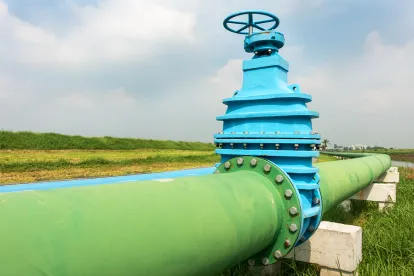Paul Roberti Named PHMSA’s Chief Counsel
On March 27, Mr. Paul Roberti was sworn in as the Chief Counsel of the Pipeline and Hazardous Materials Safety Administration (PHMSA). In that role, Mr. Roberti has responsibility for pipeline safety and hazardous materials transportation matters. Mr. Roberti has a long history of involvement in the energy industry, including a 7-year tenure as a Commissioner on the Rhode Island Public Utilities Commission. Most recently, Mr. Roberti served as an executive director at Ernst & Young.
PHMSA Modifies Approach to Proposed Rule for Gas Transmission and Gathering Pipelines
On March 26-28, the Gas Pipeline Advisory Committee (GPAC) continued consideration of the PHMSA’s notice of proposed rulemaking (NPRM) to amend the federal safety regulations applicable to gas transmission and gathering pipelines. Significantly, PHMSA announced that it will divide the NPRM into three separate final rules. According to the Department of Transportation’s (DOT) March Significant Rulemaking Report, the final rules are expected to be issued during 2019.
-
The first final rule will address pending congressional mandates, including:
-
Adding a 6-month grace period to the 7-calendar-year reassessment interval
-
Requiring that integrity management assessments consider seismicity when identifying and evaluating threats and determining preventive and mitigative measures
-
Requiring operators report exceedances of maximum allowable operating pressure (MAOP)
-
Verification of pipe materials
-
MAOP reconfirmation and other MAOP-related amendments
-
Integrity assessments outside high consequence areas (HCA) and the definition of moderate consequence areas
-
Records provisions related to these topics
-
-
The second final rule, expected in June 2019, will address:
-
Repair criteria for HCAs and non-HCAs
-
Safety features on in-line-inspection (ILI) launchers and receivers
-
Inspections following extreme events
-
Management of change
-
Corrosion control
-
Integrity management clarifications
-
Strengthened assessment requirements
-
-
The third final rule, expected in August 2019, will address new regulations applicable to gas gathering pipelines, including reporting requirements, safety regulations for Class 1 gathering lines, and definitions related to gas gathering, such as, definitions related to gas gathering: gathering, processing plant, gas treatment plant, onshore production facility and production operations.
At the March 26-28 meeting, GPAC discussed and voted on a number of provisions including MAOP reconfirmation, other MAOP-related provisions, integrity management, definitions, and repair criteria. PHMSA’s presentation slides and additional information is available here. On June 12 – 14, the GPAC is scheduled to discuss proposed regulations applicable to gas gathering pipelines.
PHMSA Rulemakings Update. The tables below summarize the status of PHMSA’s pending pipeline safety rulemaking initiatives, as reflected in the Department of Transportation’s March Significant Rulemaking Report and the Fall Unified Regulatory Agenda, released by the Office of Management & Budget’s (OMB) Office of Information and Regulatory Affairs (OIRA). The Unified Regulatory Agenda appears in two principal parts: Current Agenda Agency Regulatory Entries for Active Actions and Current Long Term Actions. New information appears in bold.
Pending Final Rules
|
Proceeding |
DOT Estimated Submission to OMB |
DOT Estimated Publication |
OIRA Estimated Publication |
|
Enhanced Emergency Order Procedures |
Not Listed |
Not Listed |
January 2018 |
|
Plastic Pipe Rule |
May 11, 2018 |
August 24, 2018 |
August 2018 |
|
Safety of Gas Transmission and Gathering Pipelines |
May 10, 2018 |
August 22, 2018 |
August 2018 |
|
Safety of Gas Transmission Pipelines, MAOP Reconfirmation, Expansion of Assessment Requirements and Other Related Amendments |
December 4, 2018 |
March 14, 2019 |
Not Listed |
|
Safety of Gas Transmission Pipelines, Repair Criteria, Integrity Management Improvements, Cathodic Protection, Management of Change, and Other Related Amendments |
March 4, 2019 |
June 12, 2019 |
Not Listed |
|
Safety of Gas Gathering Pipelines |
May 2, 2019 |
August 14, 2019 |
Not Listed |
|
Safety of Hazardous Liquid Pipelines |
May 4, 2018 |
August 17, 2018 |
April 2018 |
|
Underground Natural Gas Storage Facilities |
Not Listed |
Not Listed |
January 2018 |
Pending Notices of Proposed Rulemaking (NPRM) & Advanced Notices of Proposed Rulemakings (ANPRM)
|
Proceeding |
DOT Estimated Submission to OMB |
DOT Estimated Publication |
OIRA Estimated Publication |
|
ANPRM: Class Location Requirements |
March 30, 2018 |
May 1, 2018 |
April 2018 |
|
NPRM: Standards Update Rule - 2015 and Beyond |
Not listed |
Not listed |
June 2018 |
|
NPRM: Valve Installation and Minimum Rupture Detection Standards |
Not Listed |
Not Listed |
April 2018 |
Under Executive Order (EO) 12866, OMB reviews proposed significant rules to ensure they are consistent with applicable law, the President’s priorities, and the principles set forth in the EO, and to ensure the proposals do not conflict with another agency’s policies or actions. OMB also analyzes the cost-benefit analyses in support of the proposals. The EO sets out deadlines for OMB evaluation, but review periods are often extended.
OTHER PHMSA UPDATES
PHMSA’s Voluntary Information-Sharing Working Group will meet June 20. PHMSA has announced that the Voluntary Information-Sharing (VIS) Working Group will convene a public meeting on June 20 to continue discussing the need for and identification of a voluntary information-sharing system among operators. Topics addressed by the VIS Working Group include requirements of section 10 the Protecting Our Infrastructure of Pipelines and Enhancing Safety (PIPES) Act of 2016, integrity management, data types and tools, in-line inspection methods, geographic information system implementation, examples of existing information-sharing systems and safety management systems.
PHMSA sends Congress the agency’s responses to the National Transportation Safety Board’s (NTSB) Fiscal Year 2017 recommendations on pipeline safety. On April 2, PHMSA sent to Congress a report transmitting the agency’s responses to the NTSB’s FY2017 pipeline recommendations stemming from a 2015 oil pipeline spill in Centreville, Virginia that the NTSB determined was caused by a through-wall corrosion fatigue crack that developed at a dent. The NTSB issued Safety Recommendations P-17-1 and P-17-2 recommending that PHMSA take certain actions to address pipeline dents. PHMSA responded that dent-related failures are relatively rare and that pipeline safety regulations already require that operators address threats to pipeline integrity, including dents. PHMSA indicated that it will work with pipeline standards organizations to mitigate the risk of failures caused by dents. PHMSA also offered to issue an advisory bulletin regarding procedures and remediation to be used to address dents and provide inspectors with guidance on dent evaluation, repair criteria and remediation.
PHMSA announces it is accepting applications for Competitive Academic Agreement Program grants. PHMSA is requesting applications from non-profit institutions of higher learning to obtain a federal grant up to $300,000 to research innovative solutions to pipeline corrosion and other pipeline integrity challenges. Applications are due April 19. Additional information is here.
April is “National Safe Digging Month.” On April 1, PHMSA declared that April is officially National Safe Digging Month, reminding the public to call 8-1-1 before digging and providing information about safe digging and excavation.
PHMSA seeks comments on renewal of three information collections. On March 26, PHMSA issued a notice requesting comments on the proposed renewal, without change, of three information collections expiring during the summer of 2018. The first information collection expires June 30, and involves recordkeeping and reporting requirements for owners and operators of liquefied natural gas (LNG) facilities. The second expires July 31 and requires gas pipeline facilities to maintain records demonstrating compliance with operator qualification regulations. The third information collection expires August 31 and pertains to regulations pertaining to the inspection and notification of gas and hazardous liquid pipeline located underwater. Comments must be submitted by May 25.
SELECT UPDATES FROM STATES
INDIANA
On March 12, the Indiana Utility Regulatory Commission announced that it will host seven underground utility Safety Days during the spring of 2018. The purpose of Safety Days is to educate participants on the “Call Before You Dig” law and 811 system.
LOUISIANA
HB 727 would amend the crime of unauthorized entry of critical infrastructure, create the crime of intentional damage to critical infrastructure and the crime of conspiracy to commit either of these offenses. The bill would amend the definition of “critical infrastructure” to include flow, transmission, distribution or gathering pipelines transporting oil, gas, petrochemicals, minerals or water in a solid, liquid or gaseous state. The bill establishes civil and criminal penalties for each of these crimes. The bill was referred to the Committee on Administration of Criminal Justice.
MICHIGAN
The Michigan Public Service Commission (MPSC) has announced that it is considering revising its rules governing gas safety standards by incorporating by reference, with modification, Parts 191, 192, and 199 of the federal gas safety regulations. Comments on the proposal are due April 13.
MINNESOTA
SF 3463 and HF 3693. These bills would extend civil and criminal liability to organizations that recruit, train, aid, hire, or conspire to commit criminal trespass or damage to property at certain facilities including those of oil and gas pipelines. Senate Bill was referred to the Senate Judiciary and Public Safety Finance and Policy Committee. The House Bill was referred to the Civil Law and Data Practices Policy Committee where it was amended and re‐referred to the House Public Safety and Security Policy and Finance Committee.
SF 3441 and HF 2719. These bills would require the excavation notification center to create and update annually a database containing each Minnesota operator’s contact information. The Senate Bill was referred to the Judiciary and Public Safety Finance and Policy Committee where it was amended and re‐referred to the Energy and Utilities Finance and Policy Committee. The House Bill was introduced in May 2017 and in March 2018 was referred to the Committee on Job Growth and Energy Affordability Policy and Finance.
NEW JERSEY
ACR 164 / SCR 118 These are concurrent resolutions urging the President and Congress to require that all interstate natural gas pipelines constructed in New Jersey comply with the state’s more stringent regulations applicable to the construction, operation and maintenance of natural gas pipelines. ACR 164 has been referred to the Assembly Environment and Solid Waste Committee.
NEW YORK
S 4715A and AB 10004. These bills would require that each gas corporation submit an annual gas safety report to the New York Department of Public Service (NYDPS). The NYDPS would be required to monitor each gas corporation’s pipeline replacement projects and other activities related to safe and reliable gas service and determine whether the projects or activities are carried out consistent with New York law and NYDPS policies. The NYDPS also would be required to track spending by gas corporations and would be authorized to require that a corporation submit a cost/benefit analysis of the corporation’s use of its employees and contractors to complete replacement projects and order improvements to the corporation’s prioritization or administration of replacement projects or to operations and maintenance activities. The Assembly bill was referred to the Committee on Corporations, Authorities and Commissions and the Senate bill was referred to the Committee on Energy and Telecommunications.
OKLAHOMA
SB No. 997. Introduced on February 5, this bill would amend the Oklahoma Underground Facilities Damage Prevention Act by revising the definition of “underground facility” to include intrastate and interstate natural gas, hazardous liquid, and carbon dioxide pipelines. The bill passed the Oklahoma Senate on March 6.
HB 3407 would amend the Oklahoma Underground Facilities Damage Prevention Act to eliminate from the definition of “excavate” individuals who are excavating on their own property and are not in the excavating business for hire. The bill passed the Oklahoma House of Representatives on March 13.
WASHINGTON
SB 6269. Signed by the governor on March 23, this law amends the Oil Transportation Safety Act to expand the application of the oil spill response tax and oil spill administration tax so that it applies to owners of oil and petroleum products received at marine or bulk oil terminals from pipelines, as well as by waterborne vessels, barges and tank cars. The bill is intended to provide additional funds to the prevention preparedness services required under state law that are provided under the Department of Ecology’s oil spill program.





 />i
/>i

